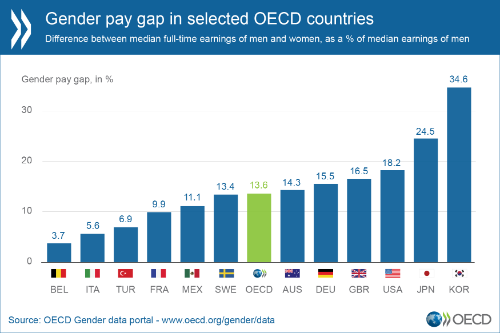Progress on gender equality is too slow, says OECD on International Women’s Day
Governments around the world are paying more attention to gender equality but progress is too slow and uneven, and much remains to be done to increase women’s rights, opportunities and participation in public life and senior jobs, according to the OECD.

Despite gender equality reforms in many countries, with innovative rules and regulations in many countries, entrenched social and cultural norms continue to maintain discrimination against women and girls, according to the Social Institutions and Gender Index (SIGI) 2019 Global Report launched in the presence of H.R.H. Princess Beatrice of York during the OECD’s March on Gender events to mark International Women’s Day. The report estimates the loss of income worldwide attributable to gender-based discrimination at USD 6 trillion, or 7.5% of global GDP.
A second OECD report presented, Forward to Gender Equality: Mainstreaming, Implementation and Leadership, finds that in advanced economies, persistent gender stereotypes and bias in policymaking and budget decisions is hampering progress. While women comprise over half of public sector employees, there are still too few women in senior public jobs and decision-making posts. The digital transformation now risks creating new divides.
“Despite a global realisation that women’s equality is an urgent priority, we are moving too slowly in closing gender gaps, and in some countries gender gaps have even widened,” said the OECD’s Chief of Staff, G20 Sherpa and leader on gender issues Gabriela Ramos. “We need to do more and to do it better. We need to be smarter in the way we design and execute policies and be held more accountable on the results; otherwise we may be looking at another 200 years to achieve gender equality.”
The latest update to the OECD’s Gender Portal shows the several areas in which gender gaps exist, including the wage gap across OECD countries that averages a stubborn 13.6%, Ms Ramos noted.
The SIGI report, covering 180 countries, finds that 33% of women worldwide have been victims of domestic abuse, although, encouragingly, social acceptance of domestic violence is receding. The share of women who say domestic violence is acceptable in some circumstances has dropped from 50% in 2012 to 37% in 2014 and 27% in 2018.
Since the last SIGI report in 2014, 15 countries have adopted legislation to criminalise domestic violence, meaning 132 countries now criminalise it while 48 do not. Another 15 countries have eliminated legal exceptions that allowed girls under 18 to be married, and eight have introduced legal measures to promote gender balance in elected public office. All but two countries – Papua New Guinea and the United States – now guarantee paid maternity leave.
Fast Forward to Gender Equality, which focuses on where OECD countries stand relative to the Organisation’s 2015 Recommendation on Gender Equality in Public Life, finds that on average across OECD countries, women now occupy 29% of parliamentary seats and 28% of ministerial posts. Among leaders in gender equality are Latvia, where the number of women elected to public office has nearly doubled to 31%, and France, where 40% of parliamentarians are women. Similar progress has been seen in Ireland, Italy, Mexico and Spain, where two-thirds of Ministerial posts were occupied by women in the last government. Certainly, all these averages mask important divergences among participating countries.
On the downside, women working in public administrations are still over-represented in low-level job categories. They occupy less than a third of senior positions in the civil service on average and make up 75% of part time workers in the public sector. The report offers guidance on using tools such as legislated or voluntary quotas and gender budgeting, which tracks spending that supports gender equality, to improve women’s participation.
Source: Organisation for Economic Co-operation and Development
- 479 reads
Human Rights
Ringing FOWPAL’s Peace Bell for the World:Nobel Peace Prize Laureates’ Visions and Actions

Protecting the World’s Cultural Diversity for a Sustainable Future

The Peace Bell Resonates at the 27th Eurasian Economic Summit

Declaration of World Day of the Power of Hope Endorsed by People in 158 Nations

Puppet Show I International Friendship Day 2020

